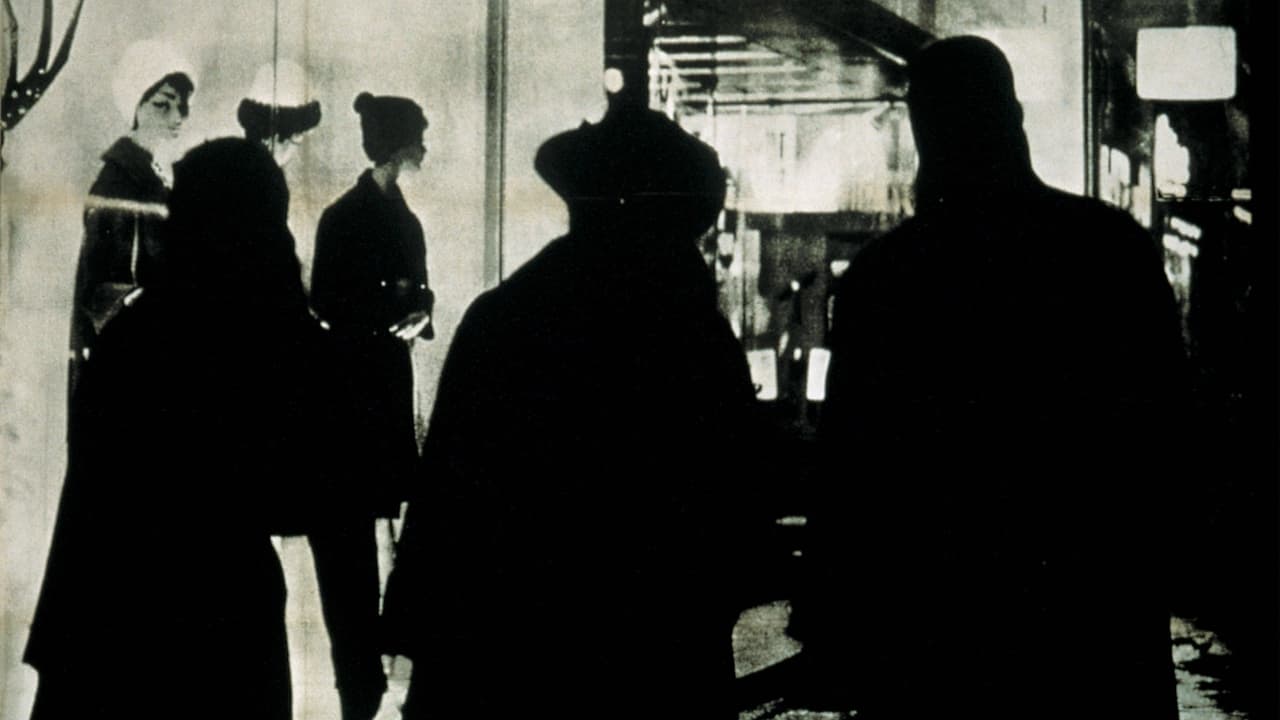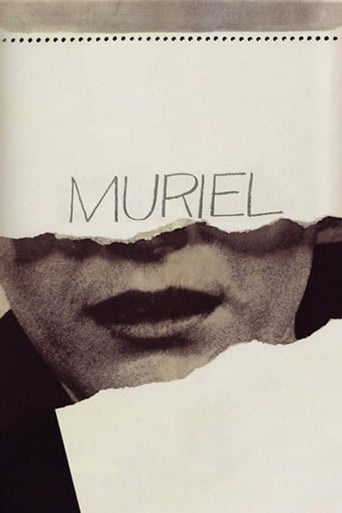

Lack of good storyline.
... View Moreif their story seems completely bonkers, almost like a feverish work of fiction, you ain't heard nothing yet.
... View MoreThe plot isn't so bad, but the pace of storytelling is too slow which makes people bored. Certain moments are so obvious and unnecessary for the main plot. I would've fast-forwarded those moments if it was an online streaming. The ending looks like implying a sequel, not sure if this movie will get one
... View MoreAll of these films share one commonality, that being a kind of emotional center that humanizes a cast of monsters.
... View MoreFrench avant-garde and former French New Wave director Alain Resnais' third feature film which succeeded his highly acclaimed first feature film "Hiroshima Mon Amour" (1959) and "Last Year at Marienbad" (1961), was written for the screen by French poet Jean Cayrol (1911-2005) and tells the story about a middle-aged antique dealer named Hèlène Aughain who lives in her inner-city apartment in the provincial port-town of Boulogne-sur-Mer with her restless and secretive stepson Bernard who is haunted by a woman from his past named Muriel. Their lives changes when Hèlène is visited by her old lover Alphonse Noyard who has brought along a young woman named Francoise.Masterfully directed by one of the greatest directors in cinema history, this character-driven and dialog-driven mystery, a metaphysical drama with rigorously composed visuals and sounds, about memories of love and war, where the past and the present is intertwined and where time dissolves, is a detailed and realistic portrayal of everyday life in a urban French town, a character in itself, where things much like the central characters are incomplete. Like Jean-Luc Godard's "Le Petit Soldat" (1960), Alain Resnais' film pointedly deals with themes of the Algerian War of Independence which had ended the year before "Muriel, or the Time of a Return" was released.The efficient use of cinematic devices and the creatively fragmented narrative is pivotal in this stringently structured and acutely written story, which is an enchantingly atmospheric and cryptic chamber piece with memorable acting performances. Like some of the greatest films made by directors Alfred Hitchcock (1899-1980) and Luis Buñuel (1900-1983), this symbolic, metaphorical and distinctly stylistic early nineteen sixties French-Italian co-production gradually decodes the consciousness of it's characters. A truly engaging and elusive depiction of the human psyche which was awarded with the Volpi Cup for Best Actress - Delphine Seyrig (1932-1990) at the 24th Venice Film Festival in 1963.
... View MoreHelene, a widow living in Boulogne, France, makes a living out of selling antique furniture and objects which she uses in her own apartment. The different pieces are part of the decor. She lives with her step-son, Bernard, a recently arrival from the Algerian front. Bernard is obsessed with Muriel, a young woman that was tortured by his army unit. He is now writing his recollection of her, as well as shooting documentary style films that deal with his recent past.As the story begins, Helene had invited an old lover, Alphonse for a visit. Perhaps looking to relive the days of her first romance, she has asked him to come spend some time with her. To her surprise, Alphonse arrives with a beautiful young woman, Francoise, who he passes as his niece. It is clear from the start they know one another in a different fashion. Taking them in as her guests is a decision that backfires on Helene.Helene has a weakness for gambling at the local casino. She loses most of the time. She seems to be pressed for money. Her good friend, Roland De Smoke, appears to be a well to do man. She gets money from him, as well as from another friend, Claudie, who holds the mortgage to her apartment, probably to guarantee getting money out of what could be a possible bankrupt Helene.Alphonse, the visitor, is an enigmatic figure. He walks all over Boulogne making friends with the locals. In fact, Alphonse shows he is hiding from his own painful past. He too, has been living in Algeria managing a sort of club which he is too vague to describe. Helene, who has thought seeing her old love would lead to some change, ends up a lonely figure because nothing turns the way she had hoped."Muriel" was Alain Resnais' third full length feature. His popularity among the art house crowd was always strong, yet this film was not seen by a wider audience, as probably the producers wanted it to be. The problem might stem from the way Mr. Resnais cut the film which might lose the viewer if not paying close attention at what is happening on the screen. The scenario was written by Jean Cayrol. The film has a lot of symbolism that will elude a casual viewing. Antique furniture that equates with Helene's loneliness, a town devastated during the war, the memories of the recent Algerian conflict are part of the message Mr. Resanais wanted to project.In Delphine Seyrig, the director found a muse, no doubt. The actress appeared in the first three films of Alain Resnais. She was a serious actress who collaborated with the likes of Joseph Losey, Luis Bunuel, Marguerite Duras, among others. Her Helene is about the best thing in the film. She gave a detailed performance, giving life to a troubled soul. Jean-Pierre Kerin appears as Alphonse. Jean-Baptiste Thierree is Bernard. Nita Klein, Claude Sainval are seen in the supporting cast.
... View MoreI had never seen an Alain Resnais movie before. Despite the fact most of my IMDb friends had told me to start off with Hiroshima Mon Amour, I was more drawn to Muriel and chose it as my first taste of Resnais. In a nutshell: it was far more interesting thematically and cinematographically (also on a purely technical level) than it was enjoyable. I'm still very glad that I saw it, though. The most fascinating aspect of it was without doubt the montage, or editing. Rather than directing or acting, or even the screen writing, it was the editing that had the lion's share of the movie, as if it were its star. I cannot think of another movie where this is quite as apparent. Some of Muriel's style of editing felt like machine-gun-fire, being so relentlessly fast and aggressive in parts, but it was in my opinion very powerful and efficient in leaving an impression of "mental flashes". This emulated the nature of memory, which is the theme at the heart of an otherwise grim and pessimistic movie. Yet this darkness is masked by an appearance of everyday banality in a provincial town, making it all the more depressing, since it's easier to relate the melancholy at its core to one's own, everyday existence. Not for nothing, the movie was also set in winter, and nothing is quite as melancholy and nostalgic as a sea-side town off-season.The last 10 minutes of the movie, more or less from the "revelation" at Hélène's Sunday lunch right to the moments in which the word "Fin" (The End) appeared on the screen, were the most powerful bout of cinematic caffeine I've experienced in a while. Until that moment I was starting to worry that the film was going nowhere too specific, or at least not somewhere that I understood or knew. Then came the final emotional earthquake, redeeming the movie tenfold, and I was virtually just as shocked as most of the characters in it.OK, I'll admit I wasn't overly enamoured of the acting. With the exception of Delphine Seyrig playing Hélène, who succeeded in convincing me with her interpretation of the character as well as making me feel sympathetic towards her, the other players left me virtually cold. For a while I thought I'd like Nita Klein playing Françoise, then I started thinking that her character was pretty much redundant and should have been far more marginal than it actually was (and what was going on between her and Bernard anyway? That felt like a contrivance). Since I mentioned Bernard, played by Jean-Baptiste Thierrée, let me say that he was the character I was least convinced by. Quite frankly, I wasn't partial to the way the actor chose to bring him to life at all. Yet he and his drama - the traumas he'd experienced during the Algerian war, his witnessing the torture of an Algerian girl, the titular Muriel, which scarred him for life - was probably the heart and kernel of the movie! Jean-Pierre Kérien playing Alphonse, is the player that most viewers here seem to criticise. In my view there wasn't much else he could have done with the character, seeing as he was mostly a pretext for Hélène's tragedy. But in the last ten minutes of the movie Alphonse's raison d'être comes sharply to the forefront, thanks to the shocking revelation previously mentioned. It was Bernard that I expected more from acting-wise, I guess. Furthermore, the soundtrack was occasionally strident and annoying, perhaps trying to be an aural version of the editing. But while it worked on a visual level, the music's jarred quality was ultimately grating.However, for the courage with which the movie tackled subjects which are best rendered in a novel form, for its successfully experimental editing, as well as its genuinely moving ending, I'll still award Muriel a pretty high score: 7.5/10 (it would have been 8 if the acting, not just from Seyrig, had been more accomplished).
... View More"Muriel" (French, 1963): Somewhere in your life you've heard some redneck fool call all foreign films a "dumb ass waste of my time". Or, if you heard it from a regular fool, you heard something like "I just didn't get it!" Well, it had to happen - this time they're both right. Directed by Alain Resnais, this film is one hot steaming pile of pretentious crap. Mediocre acting and low production values are only the start. We are also presented with a terrible mess of "artsy" editing, random shots, and bad, poorly integrated music. Maybe it wanted to be the "Beat Poem" of Film Making. Maybe Resnais had no real clear clue WHAT the goal was. But, no matter what the intent, "Muriel" exemplifies what so many people used to say about "those foreign films". Thankfully, foreign films this bad are few and far between. We, as Americans, have a much worse record when it comes to BAD movies.
... View More